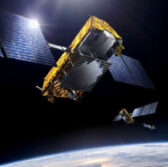 Johns Hopkins University Applied Physics Laboratory looks to receive a National Science Foundation grant to continue its observation missions using an Iridium satellite constellation, SpaceNews reported Monday.
Johns Hopkins University Applied Physics Laboratory looks to receive a National Science Foundation grant to continue its observation missions using an Iridium satellite constellation, SpaceNews reported Monday.
Dan Leone writes Johns Hopkins APL is eyeing the 66-satellite Next constellation Iridium plans to launch between 2015 and 2017 under the second phase of APL’s Active Magnetosphere and Planetary Electrodynamics Response Experiment.
Brian Anderson, Ampere principal investigator, told SpaceNews the budget for the second-stage Ampere program is set to arrive in the summer or early fall of 2015.
SpaceNews reports the APL team recently filed an application for a five-year follow-on grant on the Iridium Next constellation.
Scientists work to measure the impact of solar winds on the Birkeland electrical currents flowing between the ionosphere and low-Earth orbit, Leone reports.
The APL team worked with Iridium and Boeing‘s space operations and ground systems unit for the first two years of the program to update magnetometer software systems of Iridium satellites, according to the report.




